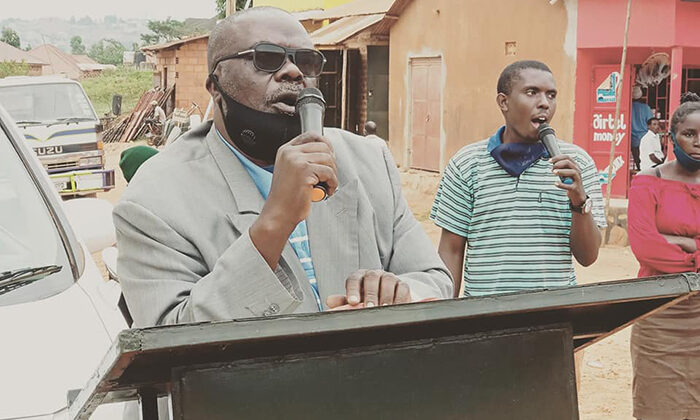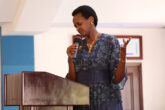
Pastor Kaloli Nsubuga. COURTESY PHOTO.
Not every Christian in Uganda has access to live streaming services or other digital platforms being used to share the gospel in wake of extended church closures due to COVID-19.
That is precisely why some Church leaders, like Pastor Kaloli Nsubuga of Miracle Worship Center, are finds creative ways to proclaim the Gospel by camping in public places.
While the President, H.E Yoweri Kaguta Museveni relaxed most coronavirus restrictions Friday to enable the private sector recover, church buildings remain closed 60 more days, along with schools, gyms and bars et cetera.
Along side pre-existing online presence — whether live stream or chats for study groups — Pastor Charles Kaloli Nsubuga is now enforcing gospel missions in market places and road-ways to share the Good News to more families and communities.
With a public address system, portable pulpit and an interpreter, Pastor Kaloli while evangelising in the central business district Kampala on Sunday urged that we are living in the End Times, hence ministers of the gospel must stay committed to preparing the nations for the coming of Jesus Christ.
He quoted Mathew 24:14 which says, “And this gospel of the kingdom shall be preached in all the world for a witness unto all nations; and then shall the end come.”
Through Matthew 11:28-29, which says in part, “Come unto me, all ye that labour and are heavy laden, and I will give you rest…,” Pastor Kaloli explained that Jesus Christ offers hope to all those challenged by the prevailing hardships triggered most especially by the COVID-19 pandemic.
He urged that God’s desire is that no one should perish, but that all should come to repentance and receive God’s gift of Salvation through Jesus Christ.
‘No internet does not mean no more ministry’
Reports show that there were 12.16 million (26.2%) internet users in Uganda in January 2021. The number of internet users in the nation increased by just 1.5 million (+14%) between 2020 and 2021.
Dr Dennis Kilama, a Ugandan Pastor and the Deputy Vice Chancellor of Africa Renewal University in Uganda, an evangelical University equipping leaders to transform society, urged in an article published by the Gospel Coalition (Africa) that in wake of COVID-19, the possibility of shepherding a congregation using the internet is far from reality and not a possibility for most African pastors.
“Internet is a luxury. Few can afford it,” he said, noting however that “this is not a time for a pastor to withdraw and take sabbatical leave.”
He warned Pastors that many congregants left with no shepherding will feed on “spiritual poison” that could cause long term destruction effects after COVID-19 is gone.
Dr Dennis Kilama said it is essential that pastors restructure the ministry operations of the church and practice leading as a team and not as individual one-man leadership. “Make sure each member is directly under some pastoral care and accountability,” he said.
He urged regular use telephone communication and recording details of the status of each member.
“Know the status of each member during this pandemic and how to support them. Most people in African churches live within a close geographical space that is walkable or accessible by public transport. It is important that a pastor practically groups members based on their place of residence. This will ensure that at any one time a member can be easily reached by another church member to provide support for one another. It should be understood that social distancing is not relational distancing,” he said.
“From the congregants to the leadership and from the leadership to the congregants. Lines of communication should be made clear to the members. Place pastoral care over the members in their different areas. Every 10 people should have a pastoral leader they can report to. Prepare material that they can use when the congregation cannot corporately gather. This could include a sermon outline, a bible study guide, and a children’s worksheet. These will inform the content of the study and scriptural reflections. And avoid the infiltration of false doctrines,” Dr Kilama said.

